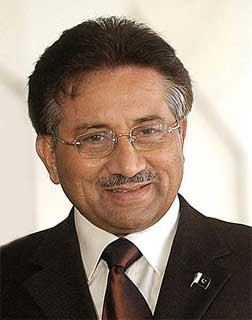2008 Musharraf Resigns

Musharraf
President Pervez Musharraf of Pakistan resigned the Presidency on August 18, 2008 after Nine years of being Presdient. Musharraf was being threatened with impeachment by a broad coalition which had been elected to parliament four months before. Musharraf had come to power after a military coup. .
.
Pervez Musharraf, a former military general, came to power in Pakistan in 1999 following a bloodless military coup that ousted then-Prime Minister Nawaz Sharif. Musharraf declared a state of emergency and assumed executive powers as Chief Executive. In 2001, he appointed himself as the President of Pakistan while remaining head of the military.
During his time in power, Musharraf implemented a number of political and economic reforms and was a key ally of the United States in the "War on Terror." However, his rule was also marked by controversy and opposition due to his suspension of the constitution, crackdown on the media, and dismissal of judges who opposed his actions.
In 2007, Musharraf declared a state of emergency and suspended the constitution, a move that sparked widespread protests and international condemnation. Despite this, he was re-elected President in a controversial election. However, in an effort to legitimize his rule, he stepped down as army chief and became a civilian president.
In February 2008, a coalition of opposition parties won the parliamentary elections, significantly weakening Musharraf's position. The new government began taking steps towards impeaching him, accusing him of misconduct and violation of the constitution.
Faced with the threat of impeachment, Musharraf announced his resignation on August 18, 2008, ending his nine-year rule. His resignation marked a significant moment in Pakistan's political history, as it was seen as a victory for democratic forces in the country.
Following his resignation, Musharraf went into self-imposed exile in London and Dubai. He returned to Pakistan in 2013 to participate in the general elections but was barred from running for office due to pending legal cases against him. Since then, he has faced a number of legal challenges, including charges of high treason related to his imposition of emergency rule in 2007.
 >
>